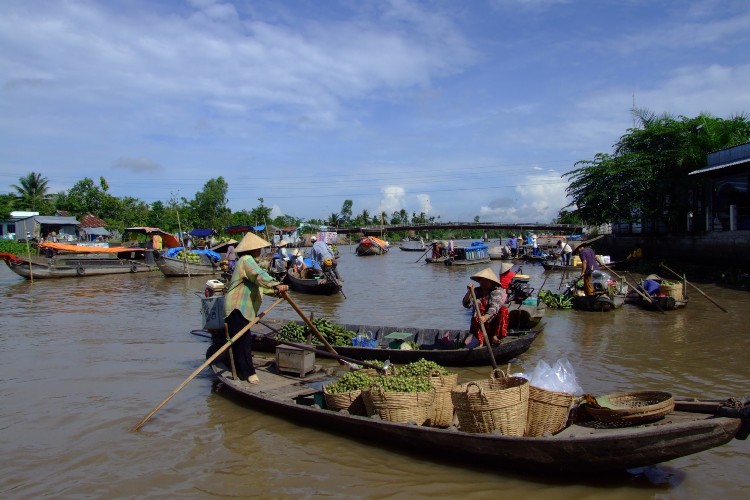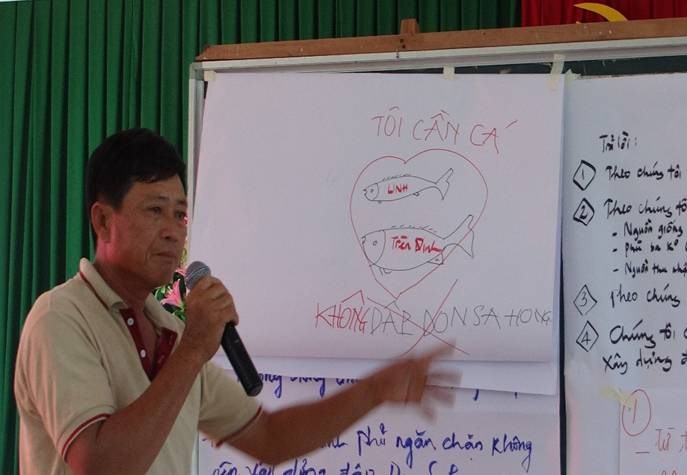A representative from PanNature suggested clearly defining the non-profit status of science and technology organizations to facilitate research, technology transfer, and application. This clarity would also enhance international collaboration and attract funding.

Vietnam Farmers Bristle at Laos’s Planned Mekong River Dam
Residents of Vietnam’s Mekong Delta have raised objections to the Don Sahong hydropower dam that Laos plans to build on the Mekong River’s main stream.
The objections came in late November after the Hanoi-based Green Innovation and Development Center, the Center for Biodiversity and Development at Vietnam Rivers Network, and local authorities finished a nearly two-week survey in communes in Can Tho and the five provinces of Ca Mau, Soc Trang, An Giang, Kien Giang, Vinh Long.
The 758 respondents were all residents of Vietnam’s Mekong Delta, who received leaflets about the discussion.
All reported having never heard of the planned dam before, but all concluded that Vietnam people would gain nothing from the dam.
The delta’s roughly 20 million residents will face many difficulties because of it, according to documents provided by the survey organizers.
An expected drop in alluvium will render the downstream soil unsuitable for cultivation and ultimately lead to erosion, undermining riverside construction.
Drought and salinization will become more severe during the dry season, they said.
Combined with the depletion of fisheries and other wildlife, the dam is expected to upend millions of livelihoods, they said.
A large number of rural Vietnamese citizens will be forced to migrate to cities for factory jobs, creating a population and employment crisis there.

Although construction of the first dam, Xayaburi, has begun and many others planned along the mainstream Mekong, this was the first time people in one country have been asked how they felt about a project in another Mekong-river country.
In September of 2013, Laos announced plans to build the Don Sahong project right in the middle of a migratory fish pathway, around two kilometers from Cambodia and 420 kilometers from Vietnam.
The final report is scheduled to be submitted at the region’s ministerial meeting next January.
In November 2012, Laos broke ground on the US$3.8-billion Xayaburi dam project despite vehement objections from environmental groups and its neighbors. Opponents said the 810-meter (2,600 feet) dam would unleash massive ecological damage on a river that feeds around 60 million people.
Environmental groups have called on the Vietnamese government to convince their Laos counterparts to abandon the project.
They further called on the residents of nearby countries to speak up on their behalf.
“Things are now shifting, and the strong determination of many Civil Society Organisation in the entire region to protect the right of the affected people and the environment is paying off,” Marc Goichot, who works for environmental group WWF’s Greater Mekong program on sustainable hydropower, told Thanh Nien News.
In June, a Thai court agreed to hear a lawsuit against state-owned Electricity Generating Authority of Thailand (EGAT) and four other state bodies for agreeing to buy electricity from the Xayaburi project. Thailand plans to buy around 95 percent of the electricity generated by the massive mainstream dam.
PanNature, a Hanoi-based environmental group, called a conference to oppose the damming of the mainstream Mekong, last September, as China began work on 15 hydropower projects on the river, while Laos, Thailand, and Cambodia planned another 11.
Experts said that in the best case scenario, the dams will destroy the region’s rice paddies and aquaculture which are its major strengths, causing an annual loss of up to US$1 billion.
The worst case scenario is a dam breach that would release 30 billion cubic meters of water into the downstream river basins.
“Because of both Xayaburi and Done Sahong projects, the Mekong has been identified as a hot spot worldwide. Vietnam, as the downstream most country, has probably the most to lose, but millions of people in Cambodia Laos and Thailand are also at risk,” Goichot said.
“The threat to the Mekong delta are real and already on going; the delta is already sinking and shrinking; Xayaburi dam will only significantly exacerbate this trend with huge environmental social and economical, repercussion for the people of Vietnam.”



